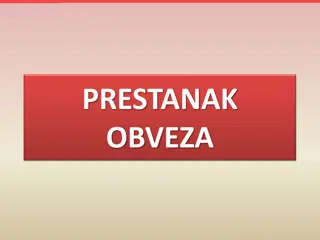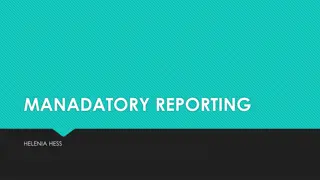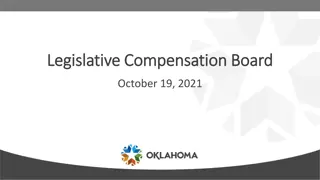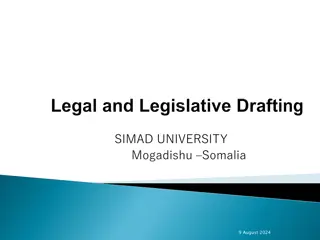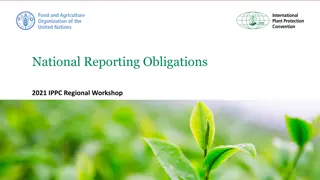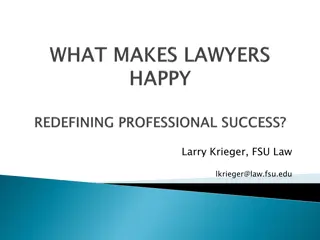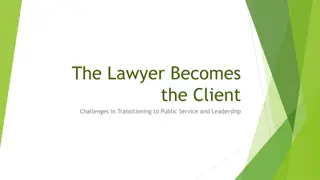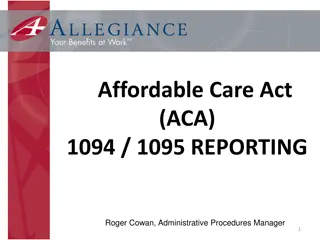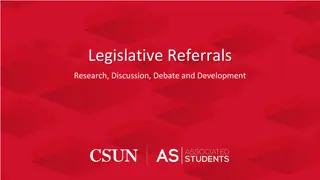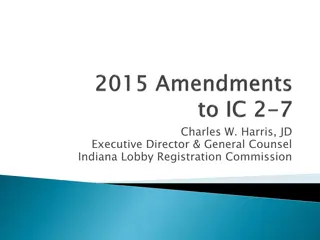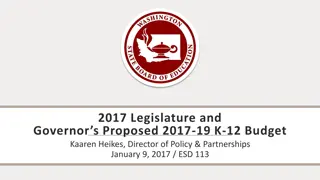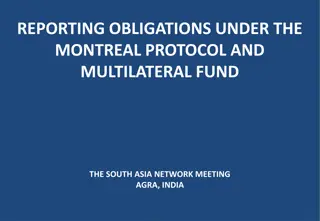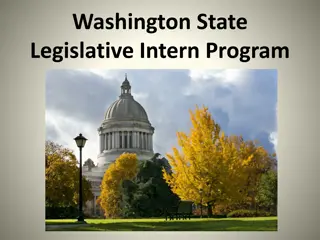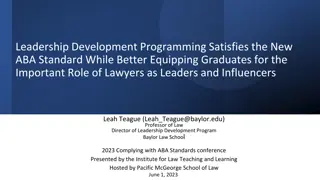Reporting Obligations for Legislative Lawyers
Explore reporting obligations for legislative lawyers including registration triggers, communication guidelines, subject matter influencing legislation, and ethics to advocate in non-adjudicatory proceedings. Discover key differences and requirements under lobby law, PFS law, and the Penal Code.
Download Presentation

Please find below an Image/Link to download the presentation.
The content on the website is provided AS IS for your information and personal use only. It may not be sold, licensed, or shared on other websites without obtaining consent from the author. Download presentation by click this link. If you encounter any issues during the download, it is possible that the publisher has removed the file from their server.
E N D
Presentation Transcript
REPORTING OBLIGATIONS FOR LEGISLATIVE LAWYERS Ross Fischer Ross Fischer Law, PLLC Austin, Texas
OBJECTIVES Discuss reporting obligations of legislative lawyers. Discern reporting differences between lobbyists and non-lobbyists. Understand reporting requirements established by the lobby law, the PFS law, and the Penal Code. Highlight disciplinary rules implicated by reporting requirements.
REGISTRATION TRIGGERS Compensation or Expenditure You must register with the TEC if you Spend more than $880 in a calendar quarter, or Are paid more than $1,760 in a calendar quarter. (The above thresholds are for 2023.)
COMMUNICATION Directly communicate In person, telephone, telegraph (!), letter, fax, email, or other electronic means (text?) With member of the Legislative branch = member, member-elect, candidate, or legislative employee Executive branch = officer, officer-elect, candidate, employee of any state agency, department, or office in the executive branch of state gov t. (Lobby law doesn t apply to localities or the judicial branch)
SUBJECT MATTER To influence Legislation Bill, resolution, amendment, nomination, or other matter pending in either chamber of the legislature. Any matter subject of action by a legislative committee, including introduction, consideration, passage, defeat, approval or veto. Administrative Action Rulemaking, licensing, or any other matter that may be the subject of action by state agency or executive branch office, including purchase of products or services.
ETHICS: ADVOCATE IN NON-ADJUDICATORY PROCEEDING TDRPC 3.10. A lawyer representing a client before a legislative or administrative body in a non- adjudicative proceeding shall disclose that the appearance is in a representative capacity and shall conform to: Rule 3.04 (Fairness in Adjudicatory Proceedings) Don t conceal, falsify, or improperly influence evidence/testimony Rule 3.05 (Maintaining Impartiality of Tribunal) Provides latitude for communicating in a rule-making or regulation-making proceeding. Rule 4.01 (Truthfulness in Statements to Others) Don t make false statement of material law or fact to a third person.
EXCEPTIONS TO COMPENSATED TIME In determining whether your compensation has passed the registration threshold, do NOT include the following activities: Comments or testimony at a public hearing. Demonstrating compliance with an existing law. Responding to a governmental audit, inspection, or investigation. Responding to an unsolicited written request for information consisting of facts or data from a member of the legislative or executive branch.
EXCEPTIONS TO REGISTRATION The lobby law provides an exception to registration if a person s only activity is: Docketed cases for attorneys of record. Bona fide media organizations. Written or oral testimony at a public hearing. Attendance at a meeting or event. Services on a board or task force with a member of the legislative or executive branch. Note that these excepted activities generally deal with public communications.
EXCEPTIONS TO REGISTRATION Compensation excluded from $1760 or 40-hour trigger: Requesting interpretive opinion Preparing documents required by law Achieving compliance with existing laws Responding to specific requests for information Communicating with legal counsel regarding pending litigation Providing testimony in public proceeding Providing comments in rule-making process
THE 40-HOUR EXCEPTION If a person spends 40 hours or less of compensated time in a calendar quarter communicating (or preparing to communicate) with a member of the executive or legislative branch, that person is not required to register as a lobbyist. A person s 40 hours includes preparatory time: research, strategy sessions, meetings to discuss legislation. This allows a person to spend a week at the Capitol at the beginning of session, and a week towards the end.
During the session, once a person triggers registration by crossing either the compensation or expenditure threshold, he or she has 5 days to register. Once registered for a client, there are no more thresholds. Any communication on behalf of another client triggers registration for that new client. REGISTRATION DEADLINE
ETHICS BREAK: REPORTING CLIENT S IDENTITY The lobby law requires the disclosure of client s identity, as well as other organizational details. The lobby law requires some detail regarding the compensation range. However, for lawyers, absent a client s informed consent, a law firm may not reveal the names of its clients or amount owed. See Opinion 479 (1991). Tip: At the outset of the engagement, get client s affirmative consent to disclose identity and fee range.
ONGOING REPORTING Once you re required to register, you must report. Reports must include: Subject Matter Category Docket Number of Administrative Matter Transportation & Lodging Food & Beverages Entertainment, Gifts, Awards & Mementos Political Fundraisers and Charity Events Mass Media Communications Once you re registered, there is no threshold for future clients.
WHAT IS A LOBBY EXPENDITURE? What is a lobby expenditure? A payment, distribution, loan, advance, reimbursement, deposit, or gift of money or anything of value and includes a contract, promise, or agreement, whether or not legally enforceable.
WHAT IS A LOBBY EXPENDITURE? What is a lobby expenditure? Expenditures that benefit a member (or candidate) or their immediate family, are made to communicate to influence legislative or administrative action, and fall into one of the following categories: Transportation or lodging (as permitted by Gov t Code 305.025) Food and beverages Entertainment Gifts Awards & Mementos Political fundraiser or charity event
Reporting by categories of person who benefit: Senators House members Elected or appointed state officers Legislative agency employees Executive branch employees REPORTING Immediate family members and invited guests of covered officials or staff Events to which all legislators are invited
DETAILED REPORTING An expenditure of more that $132.60 a day for food/beverages or transportation/lodging for a member/employee of the legislative or executive branch. An expenditure of more that $132.60 a day for entertainment for a member/employee of the legislative or executive branch or their immediate family. Applies to spouses and dependent children of covered member/employee. A gift, award or memento if the value is greater than $90. Any amount for a covered member/employee to attend a political fundraiser or political event. If $1,000 to purchase a table of 10, allocate $100 to the covered member/employee.
SPLITTING EXPENDITURES Don t split expenditures with a non-registrant. (It s technically possible, but must still be reported and may waive Penal Code protections.) When splitting, keep track of expenditure to ensure compliance with annual limits on entertainment, and gifts. ($500) You must be present to split an expenditure for most expenditures. A covered member/employee cannot buy down a portion of a lobbyist s expenditure to bring it below the detailed reporting threshold. (If a covered member wants to pay their own way, get separate checks.) The detailed reporting threshold for gifts is $90 based on the gift s total value (not a person s share). All gifts with a value over $90 must be reported in detail by all splitters.
ETHICS BREAK: CONFIDENTIALITY TDRPC 1.05 A lawyer shall not knowingly reveal confidential information without client consent. Confidential information includes privileged and unprivileged information. Privileged information is that protected by the lawyer-client privilege of Rule of Evidence 503. Client representative = (i) a person authorized to obtain legal services on behalf of the client; or (ii) any person who makes or receives confidential communication in order to effectuate legal representation.
PENAL CODE PRESENCE REQUIREMENT The Penal Code prohibits gifts to legislators, but exceptions include: Food, transportation, lodging, entertainment, if accepted as a guest AND the donor & donee abide by applicable reporting requirements. What applicable reporting requirements?
PENAL CODE PRESENCE REQUIREMENT If you re a lobbyist, report on your activity report. (But remember restrictions on transportation.) If reported on lobby report, no need to be on PFS. If you re not a lobbyist, what reporting obligations exist? Lawmaker s Personal Financial Statement? Lawmakers must report gifts of exceeding $470 (other than those reported by a lobbyist).
QUESTIONS? Ross Fischer Ross Fischer Law, PLLC ross@rossfischer.law www.rossfischer.law
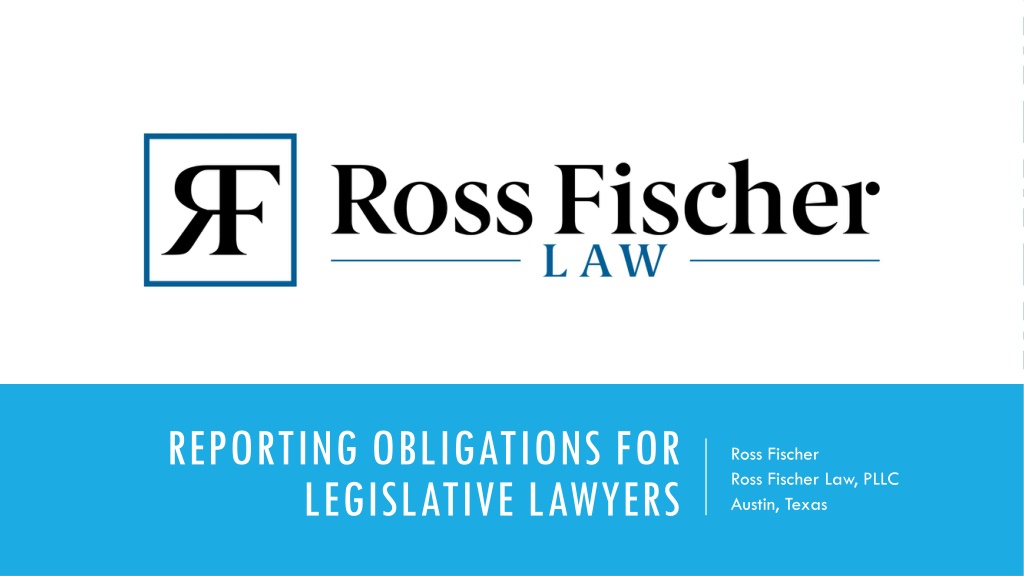
 undefined
undefined









